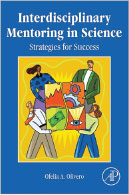Services on Demand
Article
Indicators
Related links
-
 Cited by Google
Cited by Google -
 Similars in Google
Similars in Google
Share
South African Journal of Science
On-line version ISSN 1996-7489
Print version ISSN 0038-2353
S. Afr. j. sci. vol.110 n.9-10 Pretoria Oct. 2014
http://dx.doi.org/10.1590/sajs.2014/a0081
BOOK REVIEW
Interdisciplinary mentoring in science
Brenda Wingfield
Faculty of Natural and Agricultural Sciences, University of Pretoria, Pretoria, South Africa

Interdisciplinary mentoring in science : Strategies for success
Ofelia A. Olivero
ISBN: 9780124159624
Academic Press, Oxford, USD34.95
2013
Mentorship is something I am passionate about and it was possibly for this reason that I was asked to provide a review on this book. As a starting point, I should mention that this book is not so much about mentorship as about how to put in place a mentoring programme in a scientific organisation. It is thus not a book that one should just read, but a book that one should read with the idea of putting into practice the tasks suggested.
The book is interesting and challenging and I appreciated a number of aspects about it. However, as a scientist in a developing world environment I did find the strong American focus distracting at times. Perhaps this focus was to be expected but there are some strong statements about the need for mentoring in the developing world, and particularly in sub-Saharan Africa, and I would have hoped that the American view point would not be quite so overwhelming. My advice to readers is to thus try to get beyond this view as the book does provide some very useful insights which do have an international value.
The first four chapters deal overwhelmingly with minority mentoring and gender diversity. All but one of the experts who are showcased in the book are women. From a South African perspective, there is a disjunction, as our so-called previously disadvantaged communities are in the majority. Perhaps the real 'take-home message' here is the importance of diversity. In South Africa, diversity is pretty much a given - which does not mean that we necessarily always appreciate the possible advantages of our diversity. My own opinion is that there is only one thing worse than a committee of only men: a committee of only women.
My favourite chapter was without question Chapter 5, which focuses on 'Interdisciplinary Mentoring'. This chapter was for me the most important one of the book. The value of interdisciplinarity has always been obvious to me, but this chapter served to highlight some examples as well as to explain the issues in ways that I would not have thought about. In South Africa we engage with scientists from very different backgrounds, yet very little time is spent considering these backgrounds and how some of the traditional Western norms of a scientific career can be at odds with traditional expectations. This is not to say that we have to either adopt the Western norms or just accept tradition. We need to converse and find ways of doing things even better.
The book gives some details about what is needed to be a good mentor and I would hope that most scientists would reflect on this section. So often the 'lone inventor/innovator or the multifunded, independent laboratory head, is seen as the pinnacle of success'. While this can be the case, and often has been the case in the past, I think that often the nature of how we practise science today has meant that things have changed. In most disciplines we are all involved in increasingly large data sets, meaning that collaboration, particularly across many disciplines, has become the norm. Thus we all must learn how to collaborate and put in place sustainable research cultures. There is no question that mentorship will play an important role in doing so.
I enjoyed reading this book and will be recommending it to others who have an interest in managing research programmes. In many ways, the book is very timely as we all are dealing with many of the issues discussed and could learn a lot more about mentorship.
 Correspondence:
Correspondence:
Brenda Wingfield
Faculty of Natural and Agricultural Sciences
University of Pretoria
Private Bag X20, Hatfield 0028, Pretoria
EMAIL: brenda.wingfield@up.ac.za














